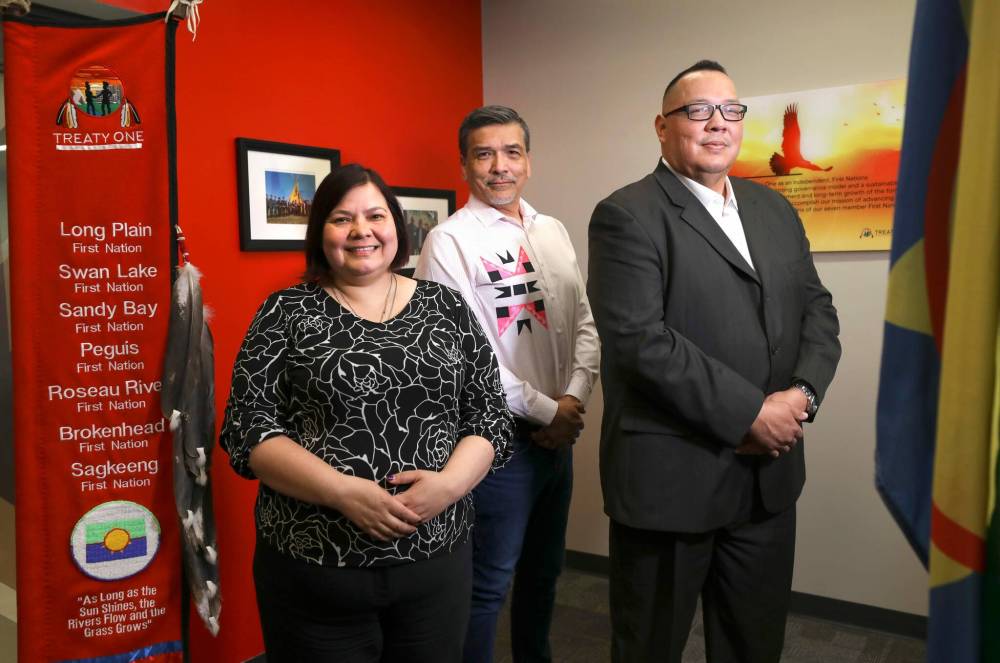City will provide services to urban reserve on former Kapyong Barracks site
Advertisement
Read this article for free:
or
Already have an account? Log in here »
To continue reading, please subscribe:
Monthly Digital Subscription
$0 for the first 4 weeks*
- Enjoy unlimited reading on winnipegfreepress.com
- Read the E-Edition, our digital replica newspaper
- Access News Break, our award-winning app
- Play interactive puzzles
*No charge for 4 weeks then price increases to the regular rate of $19.00 plus GST every four weeks. Offer available to new and qualified returning subscribers only. Cancel any time.
Monthly Digital Subscription
$4.75/week*
- Enjoy unlimited reading on winnipegfreepress.com
- Read the E-Edition, our digital replica newspaper
- Access News Break, our award-winning app
- Play interactive puzzles
*Billed as $19 plus GST every four weeks. Cancel any time.
To continue reading, please subscribe:
Add Free Press access to your Brandon Sun subscription for only an additional
$1 for the first 4 weeks*
*Your next subscription payment will increase by $1.00 and you will be charged $16.99 plus GST for four weeks. After four weeks, your payment will increase to $23.99 plus GST every four weeks.
Read unlimited articles for free today:
or
Already have an account? Log in here »
Hey there, time traveller!
This article was published 08/06/2022 (1278 days ago), so information in it may no longer be current.
The city has agreed to provide services such as police, fire and ambulance to the urban reserve at the former Kapyong Barracks site in Tuxedo.
In exchange, the seven Treaty One First Nations would collect taxes from future homeowners and business operators on the 168-acre site on Kenaston Boulevard.
Council must approve the agreement, which would then be signed by the First Nations: Long Plain, Brokenhead, Roseau River, Peguis, Sagkeeng, Sandy Bay and Swan Lake.

They will be expected to give the city two-thirds of the tax collected, which would also pay for water and sewer services. The rest would be used by the First Nations to deliver services, says a city report.
After the southwest Winnipeg land is added to reserve, Treaty One Nation will develop 68 per cent of the land, with the federal Crown-owned Canada Lands Corp. developing the rest.
“For two decades, (First Nations leaders) have pushed to reclaim our rightful place in Treaty One territory. The Gaawijijigemangit Agreement is a symbol of meaningful government to government collaboration and respectful negotiations,” said Chief Gordon BlueSky, Treaty One Nation chairperson.
“The agreement is a major step forward in expanding Treaty One Nations’ leadership in the Manitoba economy.”
Mayor Brian Bowman called it a step forward in promoting reconciliation.
“There’s a lot of talk about reconciliation, especially from politicians. This is a time we can demonstrate that our actions are going to back up our words,” Bowman said. “I’m very much hoping that it’s approved, and we’re able to finally see those lands developed after sitting vacant for two decades.”
There are two urban reserves in Winnipeg, one owned by Long Plain First Nation and the other by Peguis First Nation, but this would be the largest site in Canada, city chief administrative officer Michael Jack said in a statement.
“The collaborative approach to the creation of the Gaawijijigemangit Agreement has been unlike any previous experience, beginning with the clear, mutual understanding that the parties were building an entire community where nothing has actively existed for decades,” he said in a statement.
“While two other urban reserves currently exist within the City of Winnipeg, Naawi-Oodena is relatively novel in terms of size, magnitude of potential development, and scope of activities to be included.”
A look at what the urban reserve could achieve was revealed by Treaty One in 2021, and showed the former military base redeveloped to include 3,000 residences and 1.2 million square feet of commercial space, including community spaces and sports facilities.
The property became the centre of a decade-long legal battle over ownership between the federal government and several First Nations before the case was abandoned by Ottawa in 2015. In 2018, the federal government signed an agreement in principle to turn the land into an urban reserve.
Bowman said negotiations with Treaty One were a positive experience and he hopes they set a precedent for future talks.
“This is something that will help create jobs, not just for Indigenous people but for non-Indigenous Winnipeggers… in many ways, this is really where the rubber hits the road on a national scale when it comes to economic reconciliation and partnering with another level of government,” he said.
malak.abas@freepress.mb.ca

Our newsroom depends on a growing audience of readers to power our journalism. If you are not a paid reader, please consider becoming a subscriber.
Our newsroom depends on its audience of readers to power our journalism. Thank you for your support.
History
Updated on Wednesday, June 8, 2022 4:18 PM CDT: Writethru posted, comments added


